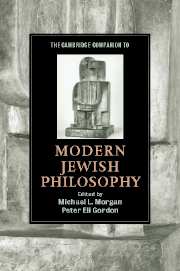Book contents
- Frontmatter
- 1 Introduction: Modern Jewish Philosophy, Modern Philosophy, and Modern Judaism
- 2 Baruch Spinoza and the Naturalization of Judaism
- 3 The Liberalism of Moses Mendelssohn
- 4 Jewish Philosophy after Kant The Legacy of Salomon Maimon
- 5 Hermann Cohen: Judaism and Critical Idealism
- 6 Self, Other, Text, God: The Dialogical Thought of Martin Buber
- 7 Franz Rosenzweig and the Philosophy of Jewish Existence
- 8 Leo Strauss and Modern Jewish Thought
- 9 Messianism and Modern Jewish Philosophy
- 10 Ethics, Authority, and Autonomy
- 11 Joseph Soloveitchik and Halakhic Man
- 12 Emmanuel Levinas: Judaism and the Primacy of the Ethical
- 13 Emil Fackenheim, the Holocaust, and Philosophy
- 14 Evil, Suffering, and the Holocaust
- 15 Revelation, Language, and Commentary: From Buber to Derrida
- 16 Feminism and Modern Jewish Philosophy
- Bibliography
- Index
2 - Baruch Spinoza and the Naturalization of Judaism
Published online by Cambridge University Press: 28 September 2007
- Frontmatter
- 1 Introduction: Modern Jewish Philosophy, Modern Philosophy, and Modern Judaism
- 2 Baruch Spinoza and the Naturalization of Judaism
- 3 The Liberalism of Moses Mendelssohn
- 4 Jewish Philosophy after Kant The Legacy of Salomon Maimon
- 5 Hermann Cohen: Judaism and Critical Idealism
- 6 Self, Other, Text, God: The Dialogical Thought of Martin Buber
- 7 Franz Rosenzweig and the Philosophy of Jewish Existence
- 8 Leo Strauss and Modern Jewish Thought
- 9 Messianism and Modern Jewish Philosophy
- 10 Ethics, Authority, and Autonomy
- 11 Joseph Soloveitchik and Halakhic Man
- 12 Emmanuel Levinas: Judaism and the Primacy of the Ethical
- 13 Emil Fackenheim, the Holocaust, and Philosophy
- 14 Evil, Suffering, and the Holocaust
- 15 Revelation, Language, and Commentary: From Buber to Derrida
- 16 Feminism and Modern Jewish Philosophy
- Bibliography
- Index
Summary
Baruch Spinoza (1632-1677) occupies a somewhat awkward position in the historiography of Jewish philosophy. In the standard story - or at least those versions of it that move beyond the simplistic description of how his philosophy represents a radical and heretical break from what comes before - he is presented either as the culmination of the Jewish medieval rationalist tradition (especially Maimonides and Gersonides) or as the father of modern Jewish thought, and sometimes as both. These are important (but still all too infrequently studied) perspectives for understanding Spinoza’s metaphysical, moral, and political ideas, and not just their antecedents and their legacies, but their substantive content as well. While most scholarly attention has been devoted to the seventeenth-century Cartesian background of Spinoza’s philosophy, his system also needs to be situated (as Harry Wolfson and others have recognized) in a Jewish philosophical context. But is this enough to give him a rightful place in a “Companion” to Jewish philosophy? After all, Thomas Aquinas was strongly influenced by Maimonides, and our understanding of the Summa Theologiae is deepened by a familiarity with the Guide for the Perplexed, but no one of course has ever suggested that St. Thomas is a Jewish philosopher. Does the additional fact that Spinoza, unlike Thomas, is Jewish alone qualify him for membership in the canon of “Jewish philosophers”?
- Type
- Chapter
- Information
- The Cambridge Companion to Modern Jewish Philosophy , pp. 14 - 34Publisher: Cambridge University PressPrint publication year: 2007
- 2
- Cited by



